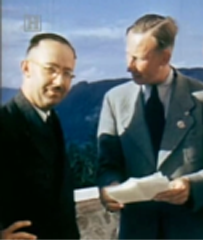much revered US Army officer posted to the Philippines in September 1940, was ordered by his commander, Gen Douglas MacArthur, to command the defense of northern Luzon against the Japanese landings at Lingayen Gulf; forced to fall back to the Bataan peninsula in order to avoid being cut off, was left in command of the besieged American and Philippine forces on Luzon after MacArthur was ordered out in February 1942; promoted to lt-gen in the field in March 1942, commanded the courageous resistance on Bataan and Corregidor before being obliged to surrender to Japanese Gen Homma 4 months later, in May 1942; one of the thousands of prisoners on the forced march known as the Bataan Death March, was subsequently transported to Manchukuo, where he remained as a POW until the end of the war; was, nevertheless, present at the signing of the Japanese surrender in Tokyo Bay in September 1945.
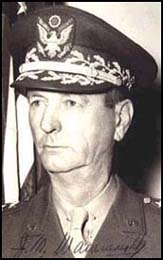
former associate of Sun Yat-sen, the Chinese nationalist revolutionary who founded the Kuonmintang, Wang Ching-wei attempted to negotiate a peace between Chiang Kai-shek and Japan in 1938 during its war against China; later became a Japanese puppet ruler at Nanking.
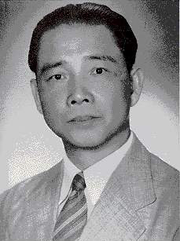
British government scientist whose research into radio-wave direction-finding was crucial to the development of the 'Chain Home' early warning radar system, installed in southern England just before the war; the first working aircraft detection radar in the world, it contributed significantly to the defeat of the Luftwaffe in the Battle of Britain in 1940; spent the war successfully extending and adapting his invention to a multitude of important military tasks.
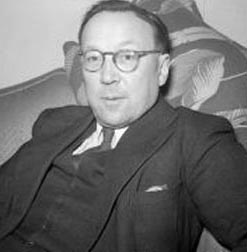
British Viceroy of India from June 1943, had tours of duty in Southe Africa and India before seeing active duty in France as a brigade commander during World War I; appointed C-in-C Middle East in July 1939, proved himself an imanginative and thoughtful commander as well as talented administrator of the enormous command area under his control, which included North Africa, East Africa and the eastern Mediterranean; despite limited resources and operational problems which wer largely ignored by London, launched small-scale offensive operations against the Italian 10th Army's advance into Egypt that drove the numerically superior Italians back across the frontier. Subsequent successes at Beda Fomm in February 1940 and at Addis Ababa, where Italian forces surrendered to his forces on April 6, were nevertheless overshadowed by the arrival in North Africa of the Afrika Korps; force to commit a large part of his force ot Greece, Iraq and Syria, was unable to counter Rommel's first offensive of the Desert War, which reached the Egyptian border on April 11; the defeat of the Allied offensive to recapture Tobruk, code-named BATTLEAXE, confirmed Churchill in his inclination toward a change of command, and he replace Wavell with Auchinleck. Transfereed to India as C-in-C in November 1941, was appointed Supreme Commander, Far East shortly after Japan's entry into the war; thus presided over the Allied defeats in the Dutch East Indies, Malaya, Singapore and Burma before returning dejectedly to India to marshal Allied efforts for an offensive against Japanese forces in Burma. A limited offensive on the Arakan front launched by him in December 1942 was beset with the familiar problems of inadequate forces, training and equipment and ended in failure; faced with complex command problems unique to the Southeast Asia theater, as well as enormous logistical and supply handicaps, was increasingly pessimistic about the Allies' ability to recapture Burma by an overland offensive, although this was strongly favored by Chinese Nationalist leader Chiang Kai-shek and his American Chief of Staff, Gen Stilwell; American complaints about his lack of motivation encouraged Churchill to make another command change, and Wavell was replaced again in June 1943 and made Viceroy of India, a political appointment which ended his involvement with military planning, though it proved no less difficult a job, coinciding with the climax of political unrest and demands for self-government in India; returned to England in 1947.
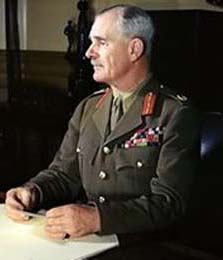
popular American general who succeeded Stilwell as Chiang Kai-shek's Chief of Staff and Commander of US forces in the China theater; began the war at the War Department, where he was regarded as an expert in war plans; in September 1943 was promoted US Deputy Chief of Staff to Lord Mountbatten, Supreme Commander of the newly created Southeast Asia Command (SEAC); in October, as a major-general, was sent to China to take over Gen Stilwell's command (now split into China and India-Burma theaters) and serve as Chiang's Chief of Staff; here his mission included repairing relations between Chiang and the US, encouraging co-operation between Chiang and the communists under Mao Tse-tung, and directing air operations from China against Japan; among his notable achievements were improvements in the training, operational quality and general conditions of the Chinese Army; continues to serve there until 1946, when her returned to the Unites States to command the 2nd Army.
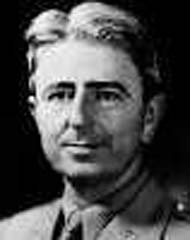
was Under Secretary of State in US (the #2 position) from 1937 to 1943; was always close to Roosevelt and made him the central figure in the State Department, much to the chagrin of secretary Cordell Hull, who could not be removed because he had a powerrful political base'; is give credit by historians for designing the United Nations; was made the key person by Roosevelt and had "a dominance over UN planning" that was "starting to embitter Hull"; did not have a political base, however, and was finally pounced upon by his enemies when they discovered what appeared to be a homosexual episode; Roosevelt, embittered, was forced to fire him; became a prominent commentator and author on foreign affairs but held no more government positions.
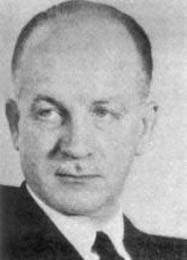
recalled from retirement to command the French Near East Theater of Operations in 1939; replaced Gamelin as Allied Commander of Land Forces at the critical stage of the German invasion of France in May 1940; in the face of imminent collapse on his front, attempted to rally forces along a defensive line on the Somme and Aisne Rivers, between the advancing German front and the French capital but had no serious hope of success; after this failure, joined with Marshal Pétain in demanding an early armistice and rejecting French Premier Reynaud's suggestions for a union with Britain to maintain a fighting front against Germany with French colonial forces; after a brief period as Defense Minister in the Vichy government, was sent as Delegate-General to North Africa, but pressures of maintaining independence from Axis and Allied influence there resulted in his forced resignation; was arrested after the German occupation of the Vichy 'free zone' in November 1942 and imprisoned in Germany until the end of the war.
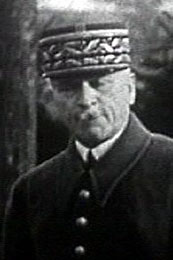
upon the German invasion of May 1940, left the safety of the Hague for the safety of the extreme south of the country but the Germans were already there; left for London May 13 and was soon joined by the government; was welcomed in London and continued to see to the affairs of state and look after the welfare of her subjects in exile; also spoke to those who were left behind on Radio Orange on the anniversary of the invasion and on other special occasions; visited the Netherlands in March 1945 as a guest of the Allied authorities but finally returned on May 2.
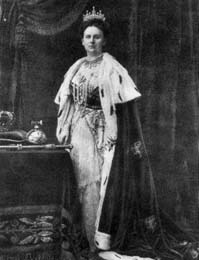
a strategist and administrator rather than a field commander, this successful British soldier oversaw the early campaigns in the desert as GOC-in-C for Egypt and then for Cyrenaica under Gen Wavell; in March 1941, led the ill-fated British expedition to Greece, but returned to more bureaucratic commands in Palestine/Syria and Persia/Iraq before his promotion to C-in-C Middle East in February 1943, when Alexander took over front-line forces in Tunisia; the following year took over Eisenhower's role as Supreme Allied Commander, Mediterranean, and was promoted to field marshal; in November 1944, was transferred to Washington, where he headed the British Joint Staff Mission until 1947.
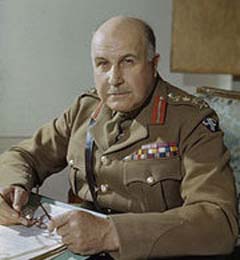
widely experienced liberal Republican politician and popular American ambassador to London from 1941, when he succeeded Joseph Kennedy; was active in improving Anglo-American relationships, involved in the arrangements for Lend-Lease and was also an important figure in the establishment of the European Advisory Committee which apportioned Germany and Berlin for post-war occupation; also attended the Casablanca and Teheran Conferences; was the American representative at the first meeting of the United Nations.
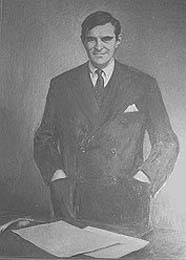
an unconventional man and controversial commander, pioneered new forms of guerrilla warfare for use against the Japanese in Burma, having gained experience in guerrilla operations and intelligence in Palestine, the Sudan and particularly Ethiopia, where he led the guerrilla unit 'Gideon Force' in 1940; his success in facilitating the conquest of Ethiopia earned him rapid promtion; following convalescence from malaria and severe depression, was called to India by C-in-C General Wavell in the spring of 1942, to develop a guerrilla force baes on 'Long Range Penetration' tactics, which he had learned from Jewish insurgents in Palestine and pioneered successfully against the Italian Army in Ethiopia; created and trained the 77th Indian Infantry Brigade from a mixed force of British, Gurkha and Burmese troops for jungle operation behind the Japanese lines; troops became known as 'Chindits' after Chinthe, the stone carved creatures which guarded Burmese shrines; launched first operation on February 8, 1943 from Imphal, the major British base in Assam, crossing the Burmese border in a two-column drive over the Chindwin River to disrupt Japanese communications and supply lines between Myitkyina and Mandalay; initial successed encouraged him to advance to the open plain across the Irrawaddy River to rendezvous with his southern force, where out of supply range, left them open to fierce counterattacks from Japanese patrols; just over 2,000 of the original 3,000 managed to make it back over the Irrawaddy in small groups by the end of March; despite high cost of the mission, his bizarre personal and military style caught the imagination of both Churchill and the British public, was invited to accompany Churchill to the Quebec Conference in 1943, where he persuaded Churchill and Roosevelt to authorize a large-sale Long Range Penetration offensive in Burma, under the overall command of Lord Mountbatten; the second Chindit operation was launched in February 1944 as part of the Allied campaign to recapture Burma; this larger force of 9,000 men played an indirect part in saving Kohima and overturning the Japanese offensive in northern Burma under General Lentaigne, Wingate was killed in an air crash over the jungle on March 24.
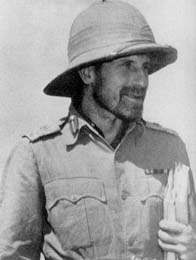
one of the 12 new German field marshals promoted after the fall of France for which he had commanded the 1st Army; was a consistent opponent of Nazism and was in touch with many of the senior army conspirators against Hitler throughout the war; durin 1941-2 served as C-in-C West, but was invalided; he would have been the conspirators' choice for Army C-in-c had the July Bomb Plot been successful, was among those tried aftewards by Friesler's People's Court; was executed by strangulation in August 1944.

adjutant to Himmler from 1935 to 1943 and his close confidant throughout the period, was also Himmler's liaison officer with Hitler from 1939; was promoted SS general in 1942 and went as military governor and SS chief to northern Italy after the Italian capitulation to the Allies, where he also acted as liaison between Hitler and Mussolini; once convinced that Germany had lost the war, and against Hitler's specific orders, arranged secret negotiations with the Allies via Allen Dulles, American head of intelligence at the Office of Strategic Services in Switzerland; German forces in Italy finally capitulated on May 2, 1045, 6 days before VE day; was sentenced to 4 years imprisonment by a German court after the war, but was arrested again in 1962 on charges relating to genocide and sentenced to 16 years imprisonment; was finally released in 1971.
